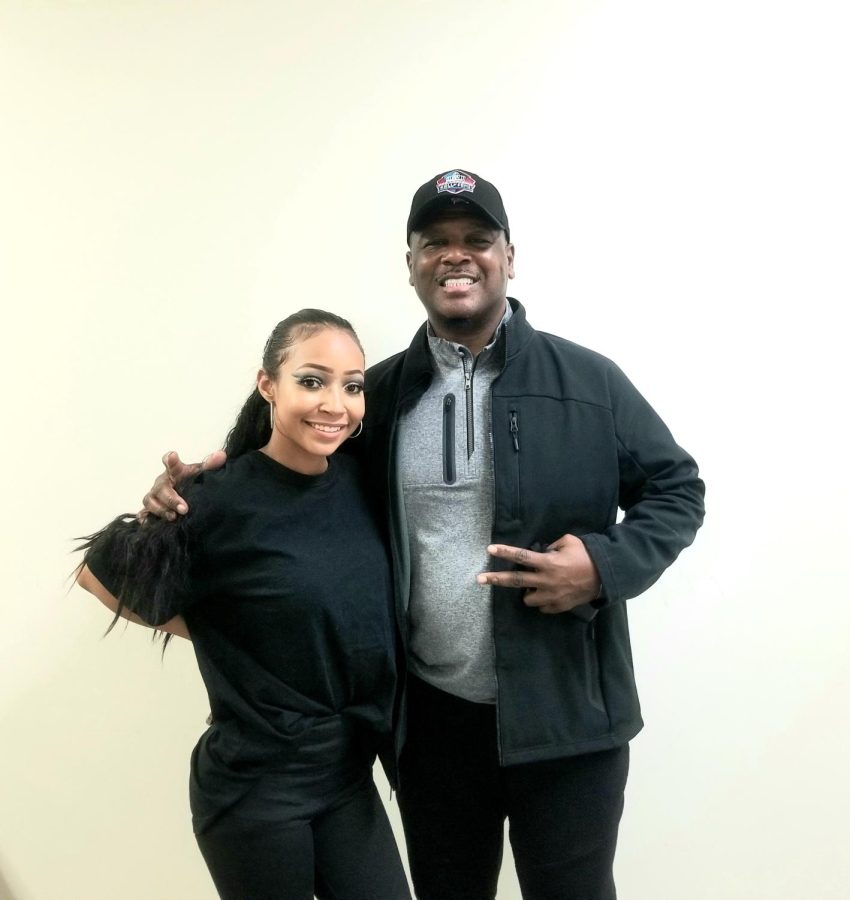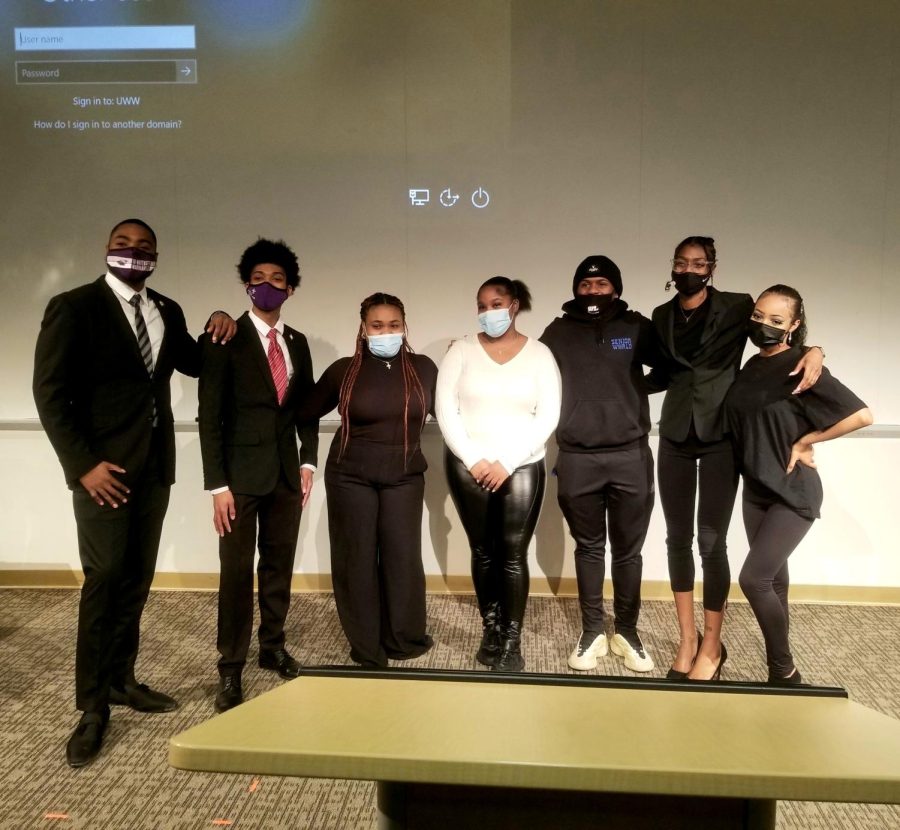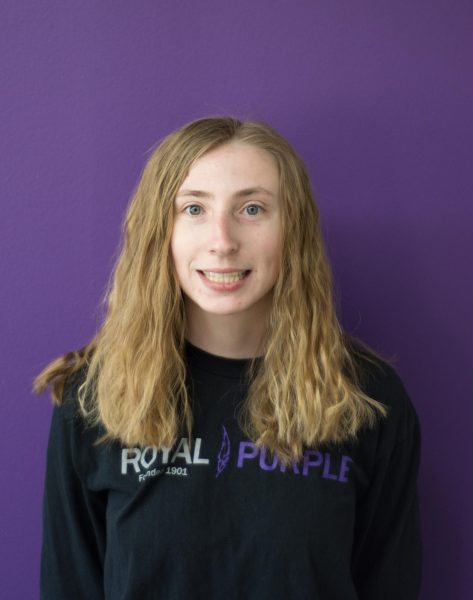LeRoy Butler backs the Warhawks
Packer and UW-W daughter perform for Black History Month
Leroy Butler stands proudly next to his daughter, UW-Whitewater student Maria Butler, at the Black History Acknowledgement event Tuesday, Feb. 15 in the Baker Tilly Lecture Hall of Hyland Hall.
February 20, 2022
LeRoy Butler empowered the UW-Whitewater campus February 15 at a Black History Acknowledgement event, along with a special performance by his Warhawk daughter as part of the TIFU Cultural Ensemble.
Butler, who was a strong safety for the Green Bay Packers from 1990-2001 came as the special guest speaker to discuss Black history with students.
One student in particular, Maria Butler, helped make the night’s event that much more special by asking her father to be the special guest. She is a current freshman majoring in elementary education. The father and former NFL player could not miss the chance to see his daughter dance and sing as a member of TIFU. He was also eager to share his experiences with students. Butler sat front and center during his daughter’s performance to watch her sing an emotional rendition of “Stand Up” by Cynthia Erivo.
“I tried to stop myself from crying three times because I know she can sing and I want to help her with her singing career. It was emotional,” said Butler. “When you see your kids it’s different compared to other people’s kids so to see your own is very emotional.”
LeRoy Butler was asked to speak to the students, not about football, but instead on something much more significant: his experience as a Black man growing up in the South. One key point of his speech included his gratitude that Black students today have groups and areas to congregate with one another in safety and discussion unlike his days as a youth. This event not only allowed him to share his own knowledge and background, but also gain more introspective than he had ever had before on Black history.
“This was very educational and very, very exciting to go down these new paths. I have found out more today than I have in my lifetime – especially coming from the South,” said Butler.
Building on his experience with the Packers, LeRoy Butler understands the importance of teamwork more than just about anybody. He can see in the long-run that keeping each other segregated would really be fumbling the ball on all our parts. This event has brought together not just dozens of Black students, but also a handful of white ones who were willing to open their minds and hearts to what’s important, and learn from individuals of a different race than their own.
“I think it opens your eyes up for everybody. That we all live in this world together. Just like, I don’t know you, you don’t know me. I don’t know your background and you don’t know my background. I figure to find some common ground in there,” said Butler. “We’re hoping everybody will find out about everybody else so we can move on and do some great things together. Because we got to live on this earth together anyway so the best thing to do is to not be afraid to find that knowledge. It’s not about white or Black, but sometimes about what you know and that’s very significant. That’s what my Ma taught me, ‘the only real color is everybody getting together to make some green.’”
This event ignited discussions about how Black history should be taught – to not just fuel empathy from non-Black individuals, but to also expand their understanding of the Black perspective and what they go through on a daily basis as minorities in a predominantly white dominated world.
“Understanding the plights of individuals and different people in social circles outside of your own – I think it will help you to gain that much more adequate information, knowledge and help you with your empathy moving forward,” said University Center program specialist Aaron Broadwater.
TIFU president, Destiny Johnson, agrees wholeheartedly with this statement. She saw this event as an important way to showcase the lives of Black students to others. With so many never caring or bothering to take notice, it is times like these when Black voices can really echo in the minds and hearts of the people around them.
“I think this is important so everyone can see our point of view because you won’t learn unless you see from our perspective. I feel like this information needed to be out there,” said Johnson.
Johnson, Maria Butler and other TIFU members performed a choreographed dance in front of the crowd to Mary J. Blige’s song “My Life.” The students were wowed by their delicate and swaying dance moves. As the women walked away after the performance they were met with a round of applause.
“I can say on my end that I was very nervous, but when we got into our content I just kind of let it go with the flow. So, tonight was very successful,” said Johnson. “It was amazing- all the practice we did leading up to this. It was a struggle, but we came out on top and I am very proud of each and every one of my e-board members.”
The event taught important lessons about Black history. Speech, song, poetry, art and dance are unique, vital parts of all cultures’ histories – especially for those that have lost much through time and colonization. Acknowledgment of Black history is not just focusing on holiday figures such as Martin Luther King Jr. and Rosa Parks, but also the African kings and queens that Black individuals today now look to as a symbol of power. Going beyond the history of slaves who spent their lives in chains or the ones proceeding after who liberated them brings out broader discussions and helps break the biases against Black individuals that have existed for hundreds of years.
While things may have gotten better since Leroy Butler first stepped foot out of the South and onto Lambeau Field, current events prove there is still work needed to ensure Black history is taught correctly through the Black perspective.
The two and a half hour experience involved an ensemble of Black leaders, performers and those who wished to share their perspectives as students of color inside the Baker Tilly Lecture Hall on the UW-Whitewater campus.
“A lot of our young student leaders actually came out and were able to take it to a whole other level. This speaks to their confidence on the topic of speaking about Black history and the acknowledgment of it – the importance of speaking to the growth of education, where it should go in regard to Black history education. That was an awesome start for us,” said Broadwater.
The Black Student Union and TIFU Cultural Ensemble partnered with the Warhawk Connection Center to host the event. To learn more about TIFU visit instagram.com/tifu.uww. To learn more about the Black Student Union visit https://uww.presence.io/organization/black-student-union.















